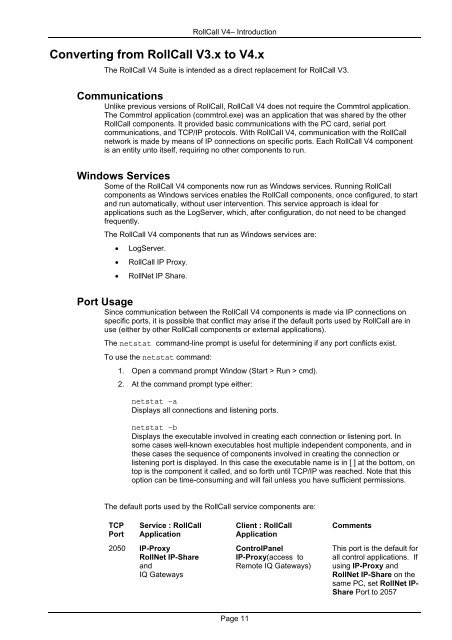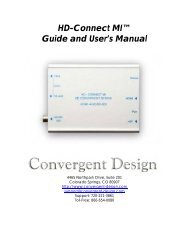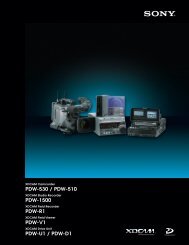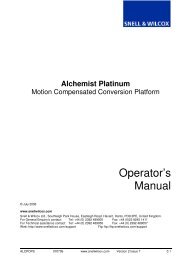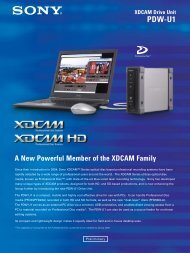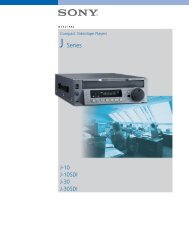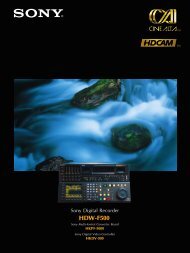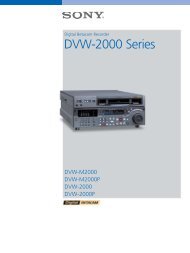RollCall V4 Suite & RollCall Lite - GRS Systems
RollCall V4 Suite & RollCall Lite - GRS Systems
RollCall V4 Suite & RollCall Lite - GRS Systems
You also want an ePaper? Increase the reach of your titles
YUMPU automatically turns print PDFs into web optimized ePapers that Google loves.
<strong>RollCall</strong> <strong>V4</strong>– Introduction<br />
Converting from <strong>RollCall</strong> V3.x to <strong>V4</strong>.x<br />
The <strong>RollCall</strong> <strong>V4</strong> <strong>Suite</strong> is intended as a direct replacement for <strong>RollCall</strong> V3.<br />
Communications<br />
Unlike previous versions of <strong>RollCall</strong>, <strong>RollCall</strong> <strong>V4</strong> does not require the Commtrol application.<br />
The Commtrol application (commtrol.exe) was an application that was shared by the other<br />
<strong>RollCall</strong> components. It provided basic communications with the PC card, serial port<br />
communications, and TCP/IP protocols. With <strong>RollCall</strong> <strong>V4</strong>, communication with the <strong>RollCall</strong><br />
network is made by means of IP connections on specific ports. Each <strong>RollCall</strong> <strong>V4</strong> component<br />
is an entity unto itself, requiring no other components to run.<br />
Windows Services<br />
Some of the <strong>RollCall</strong> <strong>V4</strong> components now run as Windows services. Running <strong>RollCall</strong><br />
components as Windows services enables the <strong>RollCall</strong> components, once configured, to start<br />
and run automatically, without user intervention. This service approach is ideal for<br />
applications such as the LogServer, which, after configuration, do not need to be changed<br />
frequently.<br />
The <strong>RollCall</strong> <strong>V4</strong> components that run as Windows services are:<br />
• LogServer.<br />
• <strong>RollCall</strong> IP Proxy.<br />
• RollNet IP Share.<br />
Port Usage<br />
Since communication between the <strong>RollCall</strong> <strong>V4</strong> components is made via IP connections on<br />
specific ports, it is possible that conflict may arise if the default ports used by <strong>RollCall</strong> are in<br />
use (either by other <strong>RollCall</strong> components or external applications).<br />
The netstat command-line prompt is useful for determining if any port conflicts exist.<br />
To use the netstat command:<br />
1. Open a command prompt Window (Start > Run > cmd).<br />
2. At the command prompt type either:<br />
netstat –a<br />
Displays all connections and listening ports.<br />
netstat –b<br />
Displays the executable involved in creating each connection or listening port. In<br />
some cases well-known executables host multiple independent components, and in<br />
these cases the sequence of components involved in creating the connection or<br />
listening port is displayed. In this case the executable name is in [ ] at the bottom, on<br />
top is the component it called, and so forth until TCP/IP was reached. Note that this<br />
option can be time-consuming and will fail unless you have sufficient permissions.<br />
The default ports used by the <strong>RollCall</strong> service components are:<br />
TCP<br />
Port<br />
Service : <strong>RollCall</strong><br />
Application<br />
2050 IP-Proxy<br />
RollNet IP-Share<br />
and<br />
IQ Gateways<br />
Client : <strong>RollCall</strong><br />
Application<br />
ControlPanel<br />
IP-Proxy(access to<br />
Remote IQ Gateways)<br />
Comments<br />
This port is the default for<br />
all control applications. If<br />
using IP-Proxy and<br />
RollNet IP-Share on the<br />
same PC, set RollNet IP-<br />
Share Port to 2057<br />
Page 11


